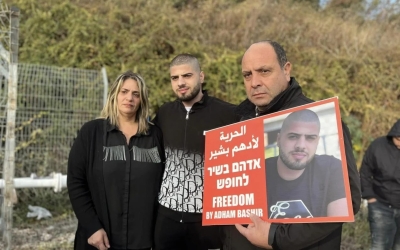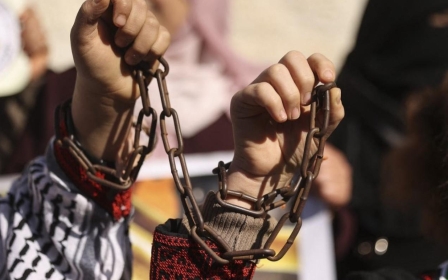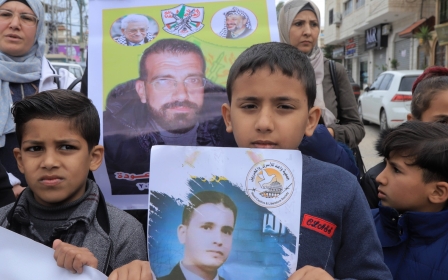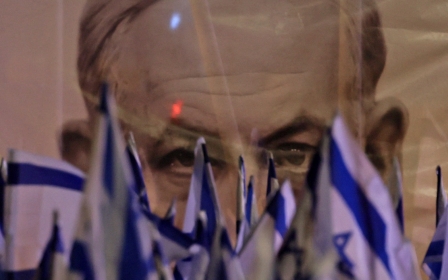Israel to deny early release of terminally ill Palestinian prisoner

Israel's public prosecution announced that it would oppose the early release of long-term Palestinian prisoner Walid Daqqa on the grounds that he suffers from terminal cancer.
Daqqa, who has been detained since 1986, was diagnosed with a rare type of bone marrow cancer several months ago and has been in and out of hospitals due to successive health setbacks.
Israel's Prison Service's (IPS) medical administration said after diagnosing him that "his days are numbered and there is an immediate risk to his life".
Sana Salama, Daqqa's wife, told Middle East Eye that the 60-year-old prisoner is currently in intensive care receiving intensive antibiotics to treat a new lung infection.
"We hope that his condition will not deteriorate and he won't be placed on ventilators, as happened after his last surgery," Salama said.
New MEE newsletter: Jerusalem Dispatch
Sign up to get the latest insights and analysis on Israel-Palestine, alongside Turkey Unpacked and other MEE newsletters
Like other Palestinian prisoners, Daqqa, who was previously diagnosed with leukemia in 2015, has suffered from medical negligence during his 37 years in prison, which has worsened his health.
According to Salama, Daqqa underwent a lung resection operation due to severe pneumonia and was hospitalised for over a month at the Barzilai Hospital in Israel.
"He also suffers from severe kidney failure and low blood pressure. After the surgery, he was unable to speak, but he's been unable to move or walk unassisted," she said.
Daqqa's deteriorating health since the surgery has put a strain on his family, prompting them to submit a request to the Israeli court for early parole.
However, according to Israeli media, the state prosecutor intends to reject the request.
On Tuesday, Israel's Minister of National Security Itamar Ben-Gvir wrote on social media that he has instructed the IPS to examine how the request was admitted to the "ordinary parole committee" instead of the "parole committee for security prisoners".
Ben-Gvir also said Daqqa "should end his life in prison".
But Salama said: "I am optimistic that Walid will come out soon and be with us, even if the request for early release is rejected, I won’t hesitate to knock on any legal door until he is released."
"Walid deserves freedom and life outside the hateful prison."
A thinker
Daqqa was due to be released from prison this year after completing his life sentence.
However, in 2018, an Israeli court sentenced him to two additional years on charges of smuggling cellphones inside the prison. His release date is now set to be in 2025.
Israel has repeatedly rejected the inclusion of Daqqa in the many prisoners swap deals that have taken place since his detention.
Dozens of petitions to Israeli courts requesting the reduction of his sentence and an early release have been rejected over the years.
Amani Sarahneh, a spokesperson for the Palestinian Prisoners Club, said that based on prisoners' past experiences, especially among patients who have asked for early release, the Israeli judiciary cannot be relied upon.
"Over the past years, there hasn’t been any positive decision in favor of prisoners who suffer from difficult or severe illnesses, but in Walid Daqqa's case, we are making new attempts and breaking through some of what is stipulated in Israeli law, and we hope that there will be a result," she told MEE.
Sarahneh believes that many political factors control the decisions of the courts, especially since the members of the far-right Israeli government have incited against Daqqa.
"There are major shifts in all issues related to prisoners because Israel uses them as a tool to win the Israeli public opinion," she said.
Still, his family says they have hope he will be released before it's too late.
In 1991, Daqqa, who hails from Baqa al-Gharbiyye, a Palestinian town in Israel, married Salama while in prison, before he was handed a 37-year sentence.
In 2020, when the IPS refused to allow the couple to meet, Daqqa managed to smuggle sperm out from prison, allowing them to have their first child, Milad.
"Milad filled a huge void - a void in my soul left by prison and the complexities of meeting Walid, the chains, and the voice of the jailer. Milad came to assure us that life is possible, and that beautiful things never end," Salama said.
In the course of his imprisonment, Daqqa has written books and studies on various subjects, and cultivated a reputation of being a thinker.
Middle East Eye delivers independent and unrivalled coverage and analysis of the Middle East, North Africa and beyond. To learn more about republishing this content and the associated fees, please fill out this form. More about MEE can be found here.





